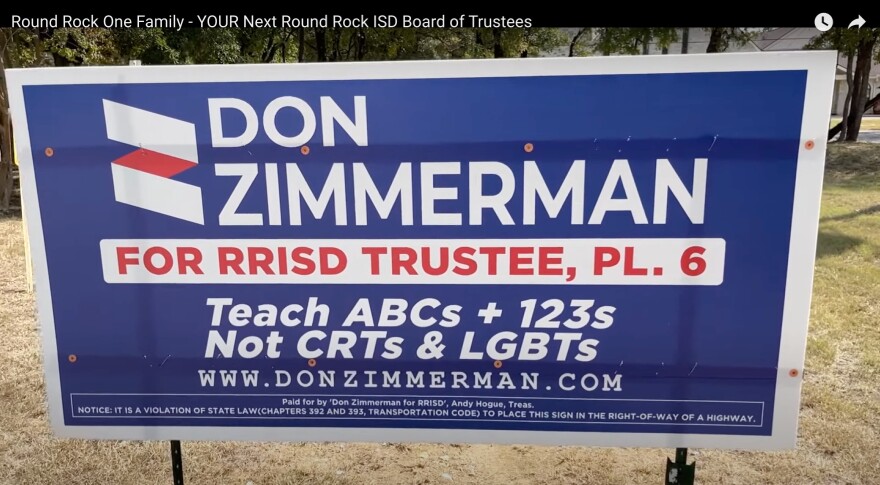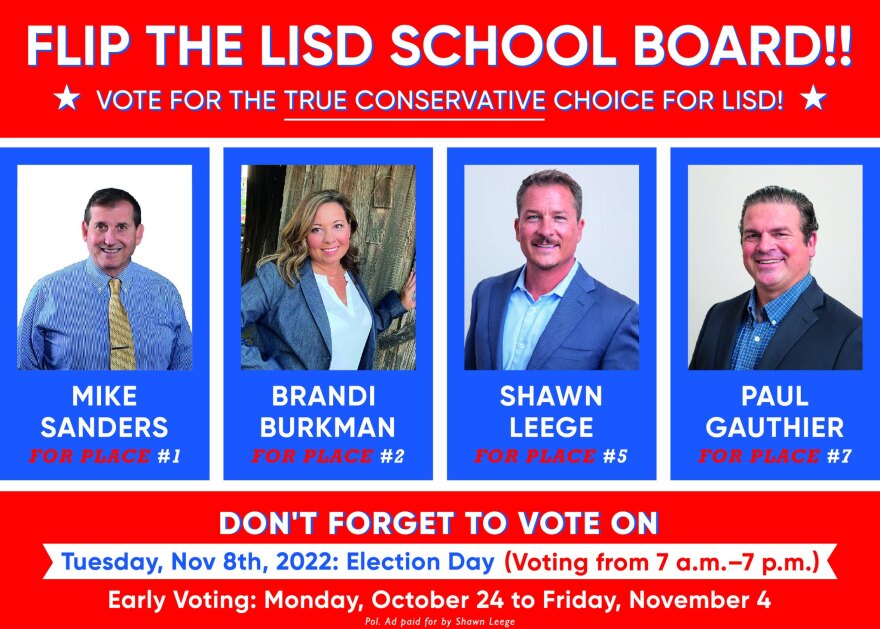Forty years. That's how long Austin-based attorney Jim Cousar has been practicing campaign finance and election law. Still, nothing could have prepared him for the "substantial amounts of money" he saw going into local school board races this midterm election cycle.
"I’ve been observing campaign finance in Central Texas really going back to the 1980s," Cousar said. "In a school board race, traditionally, there’s not that much money, and traditionally, almost all of the money will be raised by the candidate and spent by the candidate."
Instead, this election cycle saw several local political action committees formed to lend thousands of dollars and endorsements to candidates in school board races — most notably in two of Central Texas' largest school districts, Round Rock and Leander. Each district had five seats up for election.
"It’s my understanding that there is substantial amounts of money being raised and spent by individuals and groups that really care about hot-button issues," Cousar said.
Some of those "hot-button issues" include critical race theory, gender issues and sex education, he said.
Take, for example, one Round Rock school board candidate's campaign slogan: "Teach ABCs + 123s, Not CRTs & LGBTs."

Don Zimmerman, a former Austin City Council member, was one of five vetted "conservative" candidates for the school board who were endorsed and financially supported by the Round Rock One Family PAC.
The PAC sought to bring conservative values to the school district. Zimmerman's campaign received thousands of dollars from the group.
It's "unusual to see a lot of money being spent to back candidates who have an ideological agenda on the school board," Cousar said.
Volunteers become politicians
Why is so much money going into these local school board races?
First, Cousar said, it's important to note that school board members are unpaid.
"They’re frequently just, you know, doing it as a community volunteer service," he said. "A lot of them don’t even really think of themselves as politicians."
He also notes it has always been legal to spend money on school board races; most people just haven't viewed them as the kind of place where you make large financial contributions.
So what's different? It all comes back to those "hot-button issues."
"What we are seeing now is people with a very partisan agenda on these issues ... trying to push [them] into the lap of the school board, rather than the school superintendent and the professional educators," Cousar said.
Historically speaking, he said, education has not been seen as a partisan issue. That's not the case in today's campaign environment, where school board candidates are taking on the roles of politicians.
"What we’re seeing is school board races looking more and more like legislative races," Cousar said. "People talking about issues that traditionally a school board wouldn’t even really address and raising money to do that and trying to line up voters as if this were a traditional Democratic, Republican, liberal, conservative split.”
Round Rock ISD
Two major local PACs emerged out of Round Rock this election cycle — the Round Rock One Family PAC and Access Education RRISD. Both groups raised thousands of dollars, according to campaign finance reports.
Support for the Round Rock One Family's coalition of conservative candidates transcended the local level. The candidates secured endorsements from the 1776 Project, a national PAC dedicated to electing school board members committed to abolishing critical race theory, as well as thousands of dollars in financial support from the Republican Party of Texas.
Zimmerman explained the PAC's strategy to KUT.
"You have to win with a majority, especially when you’re working to reform a school district … so the only way you have a chance to do that, is to win with a slate," he said. "There’s no use in winning as individuals if you don’t have a strong majority."

Zimmerman said the group began searching and vetting potential candidates for the slate last December.
"We searched and searched … we asked all kinds of people to run and no one would run cause it’s so much work," he said. "It’s a position that pays nothing. It costs you tremendous money ... no one wants to run for the school board.”
Despite this effort, all five Round Rock One Family PAC candidates failed to win.
Instead, the five candidates endorsed by Access Education RRISD — including incumbents Amber Feller, Amy Weir and Tiffanie Harrison — swept the school board.

Access Education RRISD's website said the PAC worked diligently to recruit, support and elect school board trustees who shared its values, including placing an emphasis on "Safe Access for All" and "Equitable Practices."
Leander ISD
A similar situation played out in nearby Leander. All but two candidates endorsed by the All in LISD PAC won seats on the school board.
"I think one of the reasons why we started the PAC is we noticed that things were getting a little bit more chaotic in our school board meetings," Joel Bercu, one of the PAC's creators, told KUT. "We really care about our teachers and our administration and everybody who kind of works so hard for our kids, so we wanted to help support them."

The largely teacher-led group supported incumbents Trish Bode, Gloria Gonzales-Dholakia and Sade Fashokun, as well as newcomer Francesca Romans.
Romans, who worked in education law up until last year, said she initially got more involved in the district after her one of her sons got "roped into the book controversy."
Leander ISD removed 11 books from the district's high school curriculum last year after a year-long review of titles parents deemed inappropriate.
"I just really want to see our school districts get back to trusting the policies and the people that work for us," she told KUT.
Romans acknowledged the role All in LISD PAC played in helping her get elected.
"It was really great to see how much people in this area really care about their schools and wanna participate and they wanna see them improve," she said. "And for me as a first-time candidate, I would not be here without the help I got.”
Romans was also endorsed by Run For Something, a national PAC that helps recruit and support young progressives running for office.
Two candidates endorsed by All in LISD — Elexis Grimes and Joseph Gorordo — lost to Paul Gauthier, who ran on a slate of four conservative school board candidates.

Another conservative slate of candidates endorsed by the Texas Parents United PAC failed to win any school board seats.
Is this the new 'normal'?
Cousar said it's too early to say what future school board races will look like.
"I think it’s very hard to predict, but one thing we’ve seen ... is there’s just a whole lot more money going into politics at every level," he said. "If that trend is going to continue then we may end up seeing more money going into school board races.
"If that happens, I think it will change the way people view school boards and whether [or] not they really are nonpartisan governing boards."













